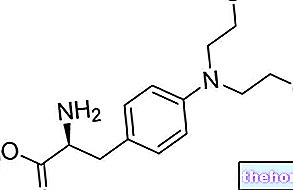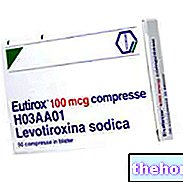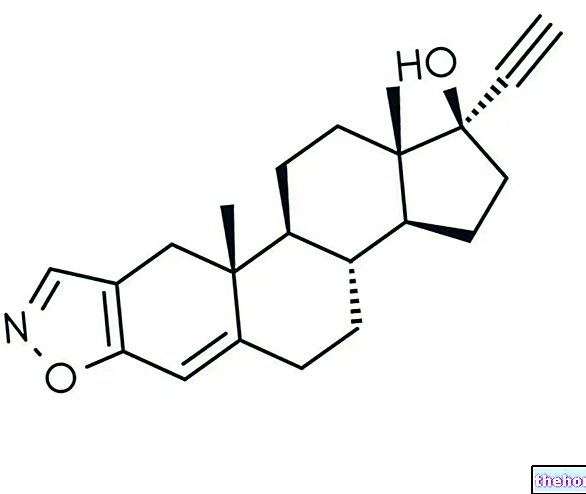STRIANT ® is a testosterone-based drug
THERAPEUTIC GROUP: Androgens, derivatives of 3-oxoandrostene

Indications STRIANT ® - Testosterone
STRIANT ® is a testosterone-based drug in mucus adhesive buccal tablets, used in the treatment of the symptoms of constitutive deficiency of this hormone present in different conditions such as hypogonadism and delayed puberty, diagnosed through clinical and biochemical tests.
STRIANT ® mechanism of action - Testosterone
STRIANT ® presents an innovative method of taking testosterone, represented by adhesive mucus buccal tablets. Through these compresses applied on the gum or on the inner surfaces of the cheeks, testosterone is absorbed by the underlying venous plexus, and directed towards the superior vena cava, enters the circulatory system without undergoing the effect of the first pass hepatic.
This particular delivery system therefore allows the achievement of maximum plasma concentrations in about 10-12 hours, which tend to gradually decrease after 4 hours from the removal of the tablet.
Bound to plasma proteins, testosterone reaches various tissues, where it is partly metabolized into estradiol and partly into DHT, which when bound to receptors for steroid hormones modulates the gene expression profile of the target cell.
The therapeutic action of testosterone can therefore be traced back to its key role in ensuring the correct maturation of male secondary characters, in controlling sexual activity, in inducing an overall anabolic phase both at the muscular, bone and haematopoietic level.
Studies carried out and clinical efficacy
1. COMPARISON OF DELIVERY SYSTEMS
J Clin Endocrinol Metab. 2004 May; 89: 2039-43.
A comparison of a novel testosterone bioadhesive buccal system, striant, with a testosterone adhesive patch in hypogonadal males.
Korbonits M, Slawik M, Cullen D, Ross RJ, Stalla G, Schneider H, Reincke M, Bouloux PM, Grossman AB.
Work that demonstrates how taking testosterone in the form of mucus adhesive buccal tablets can restore physiological concentrations of testosterone more quickly and effectively than other delivery methods such as transdermal patches.
2. STRIANT, A PHARMACOKINETICALLY EFFECTIVE ALTERNATIVE
J Clin Endocrinol Metab. 2004 Aug; 89: 3821-9.
New testosterone buccal system (Striant) delivers physiological testosterone levels: pharmacokinetics study in hypogonadal men.
Wang C, Swerdloff R, Kipnes M, Matsumoto AM, Dobs AS, Cunningham G, Katznelson L, Weber TJ, Friedman TC, Snyder P, Levine HL.
Pure pharmacokinetic study that demonstrates how the use of Striant, therefore the assumption of testosterone via the buccal mucus, can guarantee an effective and safe alternative to conventional replacement therapies.
3. STRIANT IN THE "HYPOGONADISM
Int J Clin Pract. 2004 Nov; 58: 1073-80.
Striant SR: a novel, effective and convenient testosterone therapy for male hypogonadism.
Korbonits M, Kipnes M, Grossman AB.
Further pharmacokinetic study carried out on patients suffering from hypogonadism which demonstrates how the intake of Striant can, in just 24 hours, contribute to the achievement of physiological serum testosterone concentrations, guaranteeing even better results than testosterone-based creams or patches.
Method of use and dosage
STRIANT ®
Testosterone 30mg Mucus Adhesive Buccal Tablets:
the mucus adhesive buccal tablet should be applied to the gingival region or to the inner surface of the cheeks, making sure that it adheres well, so as not to be ingested with food.
The dosage and timing of intake must necessarily be defined by the doctor, who should at the same time clarify the importance of the correct application of the patch.
In elderly patients and adults, the recommended dose is usually two tablets a day to be applied 12 hours apart.
STRIANT ® Warnings - Testosterone
The use of STRIANT ® is subject to the clinical and biochemical diagnosis of testosterone deficiency and to a careful medical examination, useful for evaluating the prescriptive appropriateness and therapeutic compatibility.
In fact, patients suffering from hypertension, epilepsy, family history or history of neoplastic diseases, cardiovascular, hepatic, renal and metabolic diseases should carefully evaluate with their doctor the cost / benefit ratio associated with this therapy, providing for the possible need for periodic checks necessary to ascertain the therapeutic efficacy and the psycho-physical state of health.
In fact, the doctor should immediately suspend the therapy, at the appearance of the first signs of both organic-functional and behavioral imbalance.
In the aforementioned cases, periodic checks would be indicated, useful for assessing the physical and mental health of the patient, providing for the immediate suspension of therapy following the appearance of the first side effects.
Use in prepubertal age should instead take place with particular attention, given the possible deleterious effects on bone growth and the too rapid development of the male genital organs.
This drug contains lactose therefore, patients with rare hereditary problems of galactose intolerance, lactase deficiency or glucose-galactose malabsorption should not take this drug
PREGNANCY AND BREASTFEEDING
STRIANT ® is a drug reserved for the treatment of pathologies of the male sex.
Its use in women, in addition to inducing virilization, if carried out during pregnancy could alter the normal process of fetal development, compromising some functions such as reproductive one.
Interactions
The different clinical trials oriented towards the study of the pharmacokinetic properties of testosterone, have observed three possible clinically relevant interactions, which emerged following the concomitant intake of:
- Anticoagulants: responsible for an increased bleeding risk;
- Hypoglycemic agents: able to induce hypoglycemia in patients undergoing therapy;
- Corticosteroids: responsible for the increase in hydrosaline retention with consequent edema and hypertension.
It is also important to remember that the intake of androgens could alter some laboratory parameters, especially those referred to liver, kidney, lipidemic and thyroid function.
STRIANT ® Contraindications - Testosterone
The assumption of testosterone is contraindicated in case of hypersensitivity to the active substance or to one of its excipients, breast cancer, estrogen-dependent neoplasms, prostatic cancer and hypertrophy, history of hepatocarcinoma, hypercalcemia, nephrotic syndrome, pregnancy and lactation.
Undesirable Effects - Side Effects
Different clinical trials and careful post-marketing monitoring have best characterized the side effects of a testosterone-based hormone replacement therapy.
These effects, which occur with greater frequency and clinical severity when used outside of medical indications (see doping), involve different organs and systems with:
- weight gain, water retention, edema and hypertension in the most severe cases;
- muscle cramps and myalgia;
- acne, hirsutism, alopecia;
- Nervousness and psychiatric symptoms;
- Disorders of the sexual sphere due to hyperstimulation;
- Prostatic hypertrophy;
- Gynecomastia;
- Oliogoazoospermia with testicular atrophy in severe cases.
To the aforementioned side effects, typical of androgen therapy, are added those related to the particular method of intake such as irritation at the application site, fatigue, gingivitis and alterations in taste.
Note
STRIANT ® can only be sold under medical prescription.
STRIANT ® is an anabolic agent, therefore its use, outside of medical prescriptions on a pathological basis, is prohibited in and out of competition.
The information on STRIANT ® - Testosterone published on this page may be out of date or incomplete. For a correct use of this information, see the Disclaimer and useful information page.


.jpg)

























